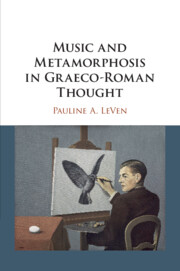Book contents
- Music and Metamorphosis in Graeco-Roman Thought
- Music and Metamorphosis in Graeco-Roman Thought
- Copyright page
- Dedication
- Contents
- Acknowledgments
- Abbreviations
- Introduction
- Chapter 1 Forest: On Surrounds
- Chapter 2 Ringdove: On the Uncanny Power of Performance
- Chapter 3 Cicadas: On the Voice
- Chapter 4 Echo: On Listening
- Chapter 5 Reeds: On Musical Objects
- Chapter 6 Nightingale: On Expression
- Chapter 7 Beetle: On Rhythm
- References
- Citations Index
- Subject Index
Chapter 2 - Ringdove: On the Uncanny Power of Performance
Published online by Cambridge University Press: 25 November 2020
- Music and Metamorphosis in Graeco-Roman Thought
- Music and Metamorphosis in Graeco-Roman Thought
- Copyright page
- Dedication
- Contents
- Acknowledgments
- Abbreviations
- Introduction
- Chapter 1 Forest: On Surrounds
- Chapter 2 Ringdove: On the Uncanny Power of Performance
- Chapter 3 Cicadas: On the Voice
- Chapter 4 Echo: On Listening
- Chapter 5 Reeds: On Musical Objects
- Chapter 6 Nightingale: On Expression
- Chapter 7 Beetle: On Rhythm
- References
- Citations Index
- Subject Index
Summary
Nothing is known about the author of Daphnis and Chloe and even the novel’s date is uncertain, although a second-century CE date seems likely. But nothing else need be known other than that Daphnis and Chloe takes its name from the main protagonists, two teenaged foundlings who grow up in the Lesbian countryside. The romance is the first of a long tradition of pastoral novels. Set in an indeterminate past, it features the typical ecology of pastoral literature: human characters who live in harmony with the landscape and other animals, and worship nature divinities (the Nymphs and Pan). Abandoned as babies by their rich parents, Daphnis and Chloe are first briefly nurtured by a goat and a sheep respectively, then rescued by a goatherd and a shepherd, and subsequently raised as members of rustic households. The novel describes how they grow up pasturing their flocks together, experience the first symptoms of love, discover love’s name, and, after many adventures, accomplish its deeds, in the last pages of the novel that culminates in their wedding night. The novel is structured in four books mapped onto the rhythm of the seasons, and our episode belongs to the first book – spring and summer. As this chapter will demonstrate, despite the omnipresence of the natural world, the myth is less concerned with animal songsters than with the uncanny power of musical performance.
- Type
- Chapter
- Information
- Music and Metamorphosis in Graeco-Roman Thought , pp. 52 - 78Publisher: Cambridge University PressPrint publication year: 2020



